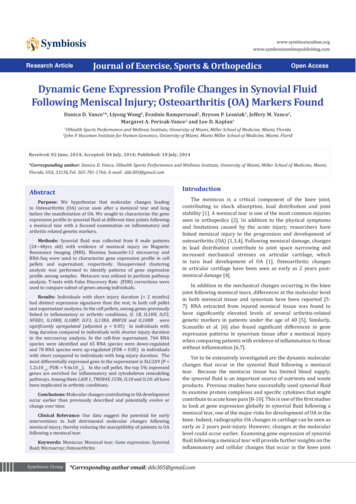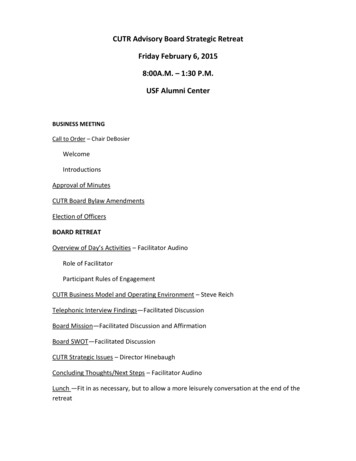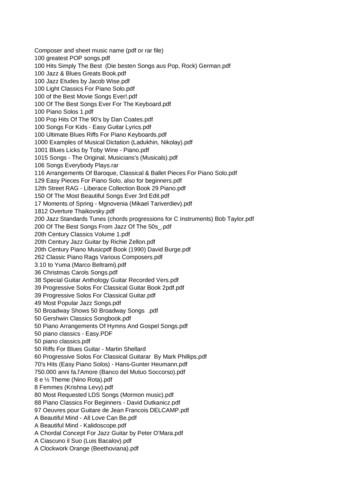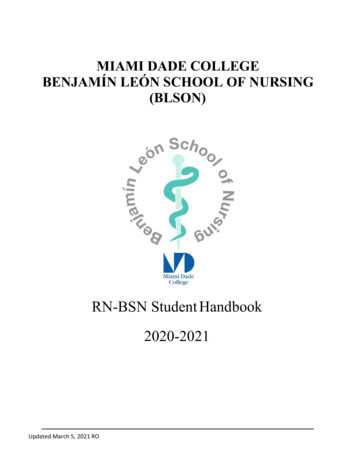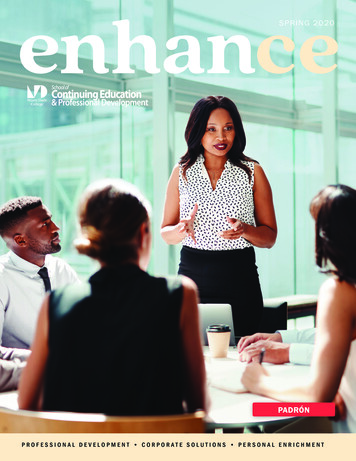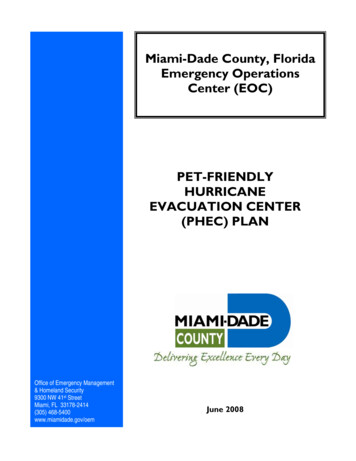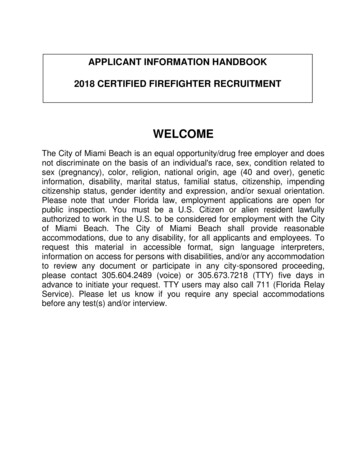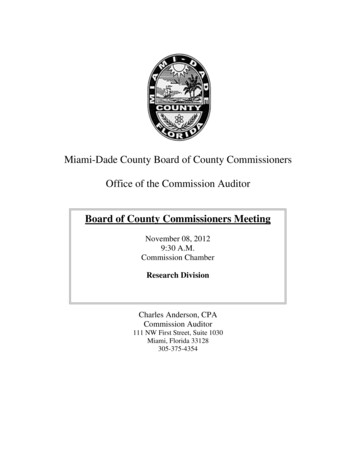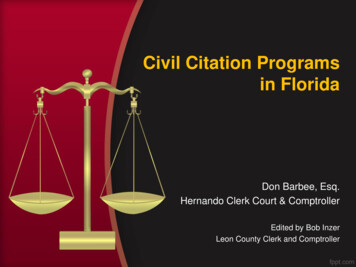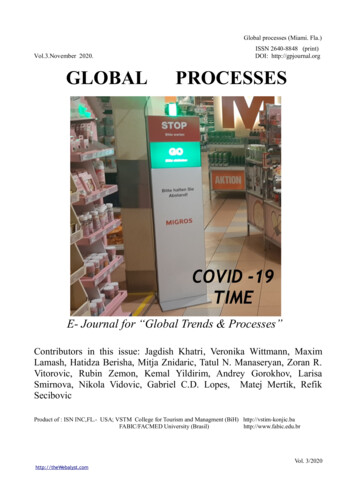
Transcription
Global processes (Miami. Fla.)Vol.3.November 2020.GLOBALISSN 2640-8848 (print)DOI: http://gpjournal.orgPROCESSESE- Journal for “Global Trends & Processes”Contributors in this issue: Jagdish Khatri, Veronika Wittmann, MaximLamash, Hatidza Berisha, Mitja Znidaric, Tatul N. Manaseryan, Zoran R.Vitorovic, Rubin Zemon, Kemal Yildirim, Andrey Gorokhov, LarisaSmirnova, Nikola Vidovic, Gabriel C.D. Lopes, Matej Mertik, RefikSecibovicProduct of : ISN INC,FL.- USA; VSTM College for Tourism and Managment (BiH) http://vstim-konjic.baFABIC/FACMED University (Brasil)http://www.fabic.edu.brVol. 3/2020http://theWebalyst.com
About E Jorunal „Global Processes“:This publication CAN NOT BE reproduced in whole or in part and in any form without specialpermission from the copyright holder, provided acknowledgement of the source is made.The E Jorunal “Global Processes” would appreciate receiving a copy of any publication that usesthis publication as a source.Suggested citation: E Journal „Global Processes“,Vol. , ISSN 2640-8848 (print), DOI:gpjournal.org.No use of this publication may be made for resale or any other commercial purpose whatsoeverwithout prior permission in writing from E Jorunal “Global Processes” or authors of paperspublished in E Journal „Global Processes“.Applications for such permission, with a statement of purpose and intent of the reproduction,should be addressed to the Director of E Journal “Global Processes”, director@gpjournal.org.DISCLAIMER:The content of this publication does not necessarily reflect the views or policies of E Jorunal“Global Processes”or contributory organizations, nor does it imply any endorsement. Thedesignations employed and the presentation of material in this publication do not imply theexpression of any opinion whatsoever on the part of E Journal “Global Processes”, concerning thelegal status of any country, territory or city or its authorities, or concerning the delimitation of itsfrontiers or boundaries.Comments on the E Jorunal „Global processes“ are welcome and can be sent to:Operational Office Address:ISN INC,FL,USAE-mails:director@gpjournal.orgStreet: SPIEGEL & UTRERA, P.A.1840SW 22ND ST 4TH FLOORMIAMI, FL 33145 USeditor@gpjournal.orgNote:For more eBook templates go to http://theWebalyst.comVol. 3/2020http://theWebalyst.com
Executive Board:Director:David Garcia J.L. Bruckner,Owner, Global One, SwissDeputy Director: Dr hc Sonja Stojanovic,Fabic University, BrasilAssoc. Director: Prof. Dr. Gabriel C.D.LopesFABIC University ,International Relations, BrasilAssoc. Director: Prof.Dr. Marijana Secibovic,Dean, VSTIM College, BiHTechnical Editor:Mitja Znidaric, SloweniaEditor in Chief:Prof. Zoran R.Vitorovic,DID (Ph.D.),Visiting Prof VSTIM,BiHDeputy Editor in Chief : Prof Luigi Santacroce (Aldo Moro University), ItalySenior Editorial Board:Prof. Dr. Zoran IlijevskiHead of the Center for Policy Research and AnalysisFaculty of Law "Iustinianus Primus"Ss.Cyril and Methodius University in Skopje ,MacedoniaProf Changgang Guo,Ph.D.,Dean, Institute of Global StudiesShanghai Univeristy, ChinaVol. 3/2020http://theWebalyst.com
Assoc.Prof. Dr. Nguyen Viet Khoi,Associate Dean, Faculty of International Business and EconomicsUniversity of Economics and Business Vietnam National University, Hanoi,Vietnam,(Vietnam National University is number 1 in Vietnam)Prof Dr. Nilton EliasPresident FABIC FACMED University,BrasilProf George TeofilovicToronto School of Managment , CanadaProf Dr. Alexander N. ChumakovProfessor, Lomonosow Moscow State University,RussiaFirst Vice-President of the Russian Philosophical SocietyProf.Dr. Javier Collado Ruano,National University of Education (UNAE) EcuadorFounder of Global Education MagazineDr.Vladimir Pacheco CuevaAarhus University, DenmarkVol. 3/2020http://theWebalyst.com
Assoc. Prof. Dr. Veronika WittmannGlobal Studies, Insitute for Modern and Contemporary HistoryJohannes Kepler University, Linz, AustriaProf. Jose M. Cosmelli, Ph.D.Rector MagnificusPro Deu Malta University, MaltaDr. Victor FaesselAssociate Director of the Mellichamp Initiative on 21st Century Global DynamicsUniversity of California, Santa Barbara. USAProf. Dr. Giovanni Luchena,Professor of Law,Aldo Moro University, Bary, ItalyEditorial Board:Prof. Stefano Soriani (Italy)Gorokhov Andrey Anatolyevich,Ph.D.( Russia)Prof. Dr. Manish Sharma (India)Zoltan Schvab (Hungary)Prof Joseph P. Garske (Japan)Assoc. Prof. Vasetsova Elena, Ph.D (Russia)Vol. 3/2020http://theWebalyst.com
Prof Rubin Zemon,Ph.D. (Macedonia)Prof Astrit Memia (Albania)Prof. Hatidze Berisha (Serbia)Senior Lecturer Stoletov Oleg (Russia)Prof Kemal Yildirim, (Turkey)Prof. Jagdish Khatri (India)Prof. Musa S.Dibadj ( Iran)Ronan Chattelier (France)Suki Medencevic (USA)Khidoyatzoda Komroni Jamolidin (Tajikistan)Prof. Tatul N. Manaseryan (Armenia)Advisory BoardH.E. Prof. Askar Akayevich AkayevFormer President of KyrgistanProfessor on Lomonosow Moscow State UniversityH.E. Rexhep Qemal Meidani,Former President of AlbaniaMember of East West Bridge Switzerland.H.E. Stjepan Mesic,Former President of CroatiaPresident of the Supervisory Board, Ingra Co.Prof.Dr. Olga ZinovievHead of International A.A. Zinoviev Science and Education Center, the Moscow State UniversityLomonossov,President of the International Intellectual Club ZINOVIEVVol. 3/2020http://theWebalyst.com
ContentEditorial .page 11. Jagdish Khatri, “ 7C's That Shaped Modi Magic Again!”.page 32. Veronika Wittmann, “ Educating Global Citizens – An Imperative of the Science in the21st Century” .page 83. Maxim Lamash, “ A President's Personal Attributes Do Not Matter”. page 184. Hatidza Berisha, “Modern Terrorism – A New Approach” .page 245. Mitja Znidaric, “ Global Treat of Terrorism During Covid -19”.page 476. Tatul N. Manaseryan ”Cooperation Advantages of Nations - Myth orReality ?” .page 557. Zoran R. Vitorovic , “Proposal For Manifesto of New Utopia ' World After Covid 19Virus Crisis “ .page 698. Rubin Zemon, “ The Slavic Identity and Nationalisms at the Balkans” .page 859. Kemal Yildirim, “ Diplomacy in an Ancient Civilization of Punt” .page 9710. Andrey Gorokhov, “Problems and Prospects of Online Education during and after theCovid -19 Pandemic” . page 10711. Jagdish Khatri, “Educational Quality : Present & Futur Scenario” .page 11312. Nikola Vidovic, Hatidza Berisha, “Global Tendencies in the Development of EducationDuring the Challenges of Digitalization and a Review of the Situation in Serbia in2020” . .page 11913. Larisa Smirnova, “ Multy – Layerded Education System of China”. page 12814. Gabriel Cesar Dias Lopes, “Neuroscience at the Service of Learning andEducation”.page 139Vol. 3/2020http://theWebalyst.com
15. Mateja Mertik, “ Revers Loop: Global to Local – Food Market Communities with Open– Source” .page 14816. Refik Secibovic, “ Integrated Study of Enterpreneurship in Tourism and FlexibleCareer Networks” .page 15917. Kemal Yildirim, “The Diplomatic Era in Hittites Civilization”.page 176Vol. 3/2020http://theWebalyst.com
Editorial Global Processes Vol. 3/2020EDITORIALVisiting Professor Zoran R.VitorovicDear Readers,In front of you is our new issue of E-Journal „Global Processes“, Vol 3. As we said last time,just one quick glance at this issue highlights our strong commitment to publish a journal aboutGlobal trends, processes and to promote international multidisciplinary scope for processes whichare going on in economy, politics, sciences, culture, and medicine.To remember all Readers, our E-Journal is open access so that anyone with an Internetconnection and web browser can access the contents of the journal free-of-charge with absolutelyno restrictions and/or registration. All published articles,photographs, tables, graphs, etc. areavailable online for the entire world to read, use, and exchange.In this issue we are proud to present 17 excellent scientific papers about different Global trendsand problems, written from eminent authors and contributors of our E-Journal.Vol. 3/2020http://theWebalyst.com
Editorial Global Processes Vol. 3/2020/page 2As we all know there are multiple problems which are expanding on our Globe, but as we allhave justone Planet Earth it is extremely important to activate all possible sources andcooperation models to find as soon as possible responds on all challenges. Climate changes,political instability, lack of medical care, economic crises etc. should not be an excuse to cooperatebetween individuals, should not be excuse not to spread positive ideas, positive way of thinking andto try to teach a Global population that each problem is just a challenge to find proper positiveanswers for global progress and stability of all societies and countries.Main thema in this issue, Vol.3., of our E-Journal is “Covid 19 Virus Time “.This should be at least our small commitment, to help all searching for responses and answersfor a benefit of all. Covid 19 Virus will stay for a many years around us, and we all need to learnhow to live with this Virus in “New Normal” Times. One is for sure – Life must go on !W.A.O. - We are all one!Till next issue we wish you to enjoy reading of our Publication.Best Regards,YourZoran R. VitorovicEditor in ChiefP.S. We have also a”Global Process” web Platform, open for scientific cooperation underwww.gpjournal.org.Vol. 3/2020http://theWebalyst.com
Jagdish Khatri7C's That Shaped Modi Magic Again Vol.3/2020./page 37C’s THAT SHAPED MODI MAGIC AGAIN!By Prof. Jagdish KhatriAbstract:India, the biggest democracy in the world, has recently undergone through parliamentaryelections that resulted into a mammoth victory of ruling coalition led by Prime Minister NarendraModi. The article attempts to highlight seven major factors that created a favourable environmentfor such a result and the mistakes committed by the opposition. It also provides an insight intoIndian electorate’s psyche. This may be an interesting study for all democratic societies andpolitical parties.Key words: India, Modi, 7C's, democracy, political partiesIntroductionsThe invincible Narendra Modi juggernaut continues to take his Bhartiya Janata Party (BJP) tonew heights of political success in India. Modi led his Party and the National Democratic Alliance(NDA) to an emphatic victory in the recently held Parliamentary elections crushing the challengerCongress Party and regional opposition groups almost in all Indian States.While the losers will continue to deliberate on the reasons for their utter failure to judge thepulse of the people, here is an attempt to highlight seven main factors that shaped the Modi Magiconce again. As these all begin with the letter C, I have termed them as the 7C’s:Vol. 3/2020http://theWebalyst.com
Jagdish Khatri7C's That Shaped Modi Magic Again Vol.3/2020./page 4Charisma:There is no doubt in the fact that none of the political leaders in India possesses ascharismatic personality as Mr. Narendra Modi, both within his own Party and outside. TheBrand Modi has further been consolidated throughout last five years by projecting the image asa strong, decisive and action oriented leader. This helped BJP to turn this Parliamentaryelection campaign into a Presidential type, converting it into a direct contest between NarendraModi against a weaker Rahul Gandhi. Modi also wisely added in his speeches that every votegiven to his Party symbol ‘Lotus’ will reach Modi directly. Thus, the individual MP candidatesbecame irrelevant for the electorate, and voters were choosing Modi when pressing Lotusbutton on the EVMs. Moreover, Modi has always been successful in building castles from thestones thrown at him. Thus, when Congress used the slogan “Chowkidar Chor Hai.” (Thewatchman is a thief himself) to destroy the clean image of Modi, he cleverly turned it to hisadvantage with a counter slogan “Main Bhi Chowkidar.” (meaning that everyone is awatchman for his country) and by adding “Chowkidar” before his name on Twitter accountwhich was followed by his colleagues too. Too much of personal mudslinging on Modi byopposition leaders resulted into a rather sympathetic attitude of electorate towards him andfurther added to his charisma.Country First:The main theme of the BJP campaign this time revolved around Nationalism and Nationalsecurity. Indian Army’s surgical strike during 2016 and the Balakot strikes in Pakistan postPulwama terror attack were projected as the symbols of muscular nationalism and a strongresponse by Indian Government like never before. Prime Minister’s quote, “Ghar mein ghuskarmaara.” (We have killed them by entering into their hideouts) was greeted with a thunderousapplause by audiences. The voters were convinced that “Country comes first”. This also helpedin implicit projection of all rivals and secular liberals as ‘anti-national’. The strategy ofpromoting Nationalism also helped in shifting focus away from Government’s performance andissues like unemployment and farm distress.Vol. 3/2020http://theWebalyst.com
Jagdish Khatri 7C's That Shaped Modi Magic Again Vol 3/2020./page 5Communal Card:BJP was successful in combining stronger nationalistic sentiment with aggressivepolarisation of majority voters against perceived threat from minorities. This was reflectedopenly by choice of its candidates and aggressive speeches delivered by senior BJP leadersduring campaign. This strategy was especially effective in building voter base in the states ofWest Bengal and Hindi heartland.Communication:The communication skills of Prime Minister were used to the fullest through large numberof rallies and through personal interviews to electronic media which played a highly supportiverole. Moreover, the vast army of BJP supporters on the social media maintained a sustainedindoctrination of groups in favour of Narendra Modi as the ultimate leader and in demonizingthe opposition. Through the campaign #‘AayegaToModiHi’ (Whatever happens, Modi willsurely return back), the electorate were made to convince the invincibility of Narendra Modi.The volunteers of RSS also played a vital role by personally contacting individual householdsin Hindi heartland and convincing the voters in favour of BJP.Chemistry:The exemplary chemistry between Prime Minister Modi and his confidante BJP PresidentAmit Shah made an invincible combination. Amit Shah, like Mr. Modi, was an indefatigablecampaigner and an astute political strategist. On the other hand, the opposition kept dependingupon arithmetic of caste based votes, like in the important state of Uttar Pradesh, the‘gathbandhan’ (coalition) of Samajwadi Party and Bahujan Samaj Party kept dreaming of widespread winning just on the arithmetic of their traditional voters. Moreover, the chemistrydisplayed by the ruling NDA partners during nominations and later in campaigning was muchmore solid than the poor show of personal aspirations by opposition stalwarts and absence of acommon leadership face.Vol. 3/2020http://theWebalyst.com
Jagdish Khatri 7C's That Shaped Modi Magic Again Vol 3/2020/page 6Collaborations:BJP, led by its relentless President Amit Shah, was able to negotiate and build productivealliances with regional outfits well in time in almost all states. The strategy of accomodatingthe unjustified whims of alliance partners like Shiv Sena in Maharashtra, Janata Dal (United)and Lok Janshakti Party in Bihar, and Apna Dal in UP also paid dividends. On the other hand,opposition was hardly able to build alliances even till nominations stage. Congress failed tofind allies in crucial states of UP, West Bengal and Delhi; resulting into division of oppositionvotes. The promised ‘mahagathbandhan’ (grand alliance) never showed signs of becoming areality.Continuity:Even if the voters were not fully satisfied by the Narendra Modi Government’s performancein its first term of five years, especially with regard to economy, they were not averse to givingit a second chance to fulfil its promises. TINA (There Is No Alternative) factor was in mind ofvoters even if opposed to BJP brand of politics. Moreover, there was a strong mindset ofkeeping their choices separate for Central and State governments. Hence, while Congress wasable to form its governments in the states of Madhya Pradesh, Rajasthan and Chhattisgarh onlya few months back defeating BJP in direct contest, the result of this election was a nearwhitewash, as the same voters preferred a strong & stable government at Centre. In Karnatakaalso, even though in power with the Janata Dal (Secular), its performance was worst.ConclusionsThus, it is evident that the new generation of voters have rejected the earlier practices ofidentity based, caste based and dynastic politics. This also reflects the maturing of democracythrough peaceful acceptance of the wish of general public.Vol. 3/2020http://theWebalyst.com
Jagdish Khatri 7C's That Shaped Modi Magic Again Vol 3/2020./page 7About the Author :Prof. Jagdish Khatri, India is a popular Management faculty, speaker, trainer & motivator;with over 41 years of work experience in industry and academics. He is associated with JohannHeinrich Pestalozzi University, USA and Lomonosov Moscow State University, Moscow and anumber of other reputed institutions. He has been Director of Business Management & Chairholderof UNESCO Network Chair at Mandsaur University and Director at Sanskaar College ofManagement, Allahabad, India. He has conducted training programs for industries & students formore than 40,000 man-hours on different topics. He has presented dozens of papers & articles, andorganised several National level Conferences. He has also been a Council Member of All IndiaManagement Association and President of Allahabad Management Association. He is Member onthe Editorial Boards of several international journalsVol. 3/2020http://theWebalyst.com
Veronika Wittman Educating Global Citizens Vol.3/2020./page 8EDUCATING GLOBAL CITIZENSAN IMPERATIVE OF SCIENCE IN THE 21st CENTURY !By Assoz. Univ.-Prof.in Dr.in Mag.a Veronika WittmannIntroductionsThe issue of the journal “Foreign Affairs” (2020) from July/August 2020 entitled “The worldafter the pandemic” deals with the central question: Lessons learned? So, what are the lessons thathumanity can learn from the current pandemic?This present paper first answers this question by claiming the necessity of educating globalcitizens as an imperative of science in the 21st century.Secondly, it argues that education is a very powerful tool to strengthen global awareness.Hereby components for educating global citizens are presented.Thirdly, the need for a global shift in science is illustrated. Covid-19 has demonstrated tohumanity the necessity for an understanding of science that establishes and enables transnational,innovative, cross-disciplinary research grounds (like Global Studies) at universities all over theworld.Vol. 3/2020http://theWebalyst.com
Veronika Wittman Educating Global Citizens Vol.3/2020./page 91. First lesson: Covid-19 is a global human experience: No one is not affectedFirst of all, the current pandemic teaches the interconnectivity and interdependence ofhumanity. Covid-19 is a global human experience: No one is not affected. The British PrimeMinister was as much confronted with the disease as a slum dweller living in a disenfranchisedcommunity in the Global South.At the same time, the pandemic has showed humanity the vulnerability of world regions andpeople. According to the UN world water development report 2019 (UNESCO 2020a), two billionpeople on the planet do not have access to clean water, and as such cannot was their hands withsoap and water in order to prevent the disease.Covid-19 has also revealed that no individual state or world region can deal with this globalthreat on its own. As much as in the last decades some political scientists have declared that thepolitical world order has to be described as “Every Nation for Itself” (Bremmer 2012), it is evidentthat this current pandemic cannot be solely solved by any given state. Whether some politiciansmight like it or not: global risks endangering humanity call for the multilateral cooperation of statesand world-regions. What is needed in order to deal with universal threats in a sustainable andeffective way are the joint efforts of all the states in the world.As such, the first lesson to be learnt from Covid-19 is that humanity shares global risks whichcan only be dealt with by multilateral cooperation and common efforts. Although the vulnerabilityof people across the globe is different, the current pandemic has demonstrated at the same timeclearly: it is a universal human experience.2. Second Lesson: Global problems need global solutionsSecondly, Covid-19 made it clear once again that: Global problems need global solutions. Theglobal challenges that lie ahead of humanity in this century are enormous. Climate change, the lossof biodiversity, transnational terrorism, effects of digitalization and artificial intelligence alteringhuman life and the socio-economic status quo as well as changing world politics are all universalstrains which cannot be solved by any given state alone.Vol. 3/2020http://theWebalyst.com
Veronika Wittman Educating Global Citizens Vol.3/2020./page 10In order to meet these complex challenges in a sustainable way, humanity has to developglobal solutions. Albert Einstein (2020:6) pointed out this argument precisely by stating:“Problems cannot be solved with the same way of thinking that created them!”In an era where problems are universal and risks affect all of humanity, it is evident that newways of solving these difficulties have to be found. This calls for science to get involved in findinginnovative ways of thinking.Science and the universal transfer of knowledge is a key to ensuring profound academicdiscourse in the global age and contributing to the raising of global awareness on a world-widescale. Any thoughtful scientific training also needs education on global issues. Universities all overthe globe should establish Global Studies programmes, where students can learn and discuss topicsconfronting all of humanity. The contribution of science to meeting global challenges is a pressingconcern of time, thereby scientists are perceived as highly relevant actors in the global age who canprovide profound expertise on educating global citizens.Science must address the question of universal issues and global challenges in the 21 st centurywith innovative ways of thinking. The problems are too complex and wide ranging for any state oracademic discipline to solve alone. Therefore, raising global awareness by educating global citizensis an urgent matter for universities and academic institutions. Education is a very powerful tool inachieving the goal of finding common solutions for humanity.Components for educating global citizens are as follows:Societal Aspects: Education on models of society beyond the state should be provided forstudents. These include approaches of international society (see Buzan 2004, Buzan 2014, BullandWatson 2017), transnational society (see Kaiser 1969), global society (see Albrow 1996) as wellas world society (see Burton 1972, Luhmann 2003, Luhmann 2013, Wittmann 2014, Wittmann2015). As much as all these above-mentioned societal models differ according to their theoreticalbasics and methodology, they all agree on the point that any understanding of society has to have aglobal frame of reference.Vol. 3/2020http://theWebalyst.com
Veronika Wittman Educating Global Citizens Vol.3/2020./page 11As such, any state-related comprehension of society that equates society solely with a state isoutdated in the global age, and no longer adequate to understand social and societal structures andrelations in the global age.Political Aspects: Students should be educated on topics of global governance (seeKennedy/Messner/Nuscheler 2001) and multilateral cooperation. The role of states changes due toglobal processes and topics of political power will alter due to digitalization processes. Oneexample of this is Darknet, an overlay network within the internet and part of the greater deep web,which is overthrowing conventional forms of political power. No state throughout the world isunaffected by it and it cannot be governed by any political regime.Covid-19 has brought the state back on the stage of the political world order, at the same timeit is evident that states have to cooperate to find an effective and sustainable way of dealing with thepandemic. It is a fact that nowadays philanthropic organizations like the Bill and Melinda GatesFoundation take on the responsibility of raising global issues about Covid-19 and donating moneyto the international community, whereas the USA have opted out of the WHO and by doing so didnot demonstrate a commitment to global responsibility. The ongoing rise of civil societyorganizations, which can be observed since the 1990s, remains a trend in world politics. As much asglobal civil society organizations have become active agents in the raising of universal issues, theyhave also become relevant actors in world politics.Economical Aspects: Education on inclusive economic growth and sustainable economicdevelopment should be provided for students. Sustainability has become an agenda for the economyand has turned into quite a prominent label for entrepreneurship across the globe. The formerGeneral Secretary of the UN Kofi Annan established the UN Global Compact (2000) due to anawareness that global problems are too big to be solved solely by states and civil societyorganizations. As such, businesses and companies have to be involved in finding solutions forhumanity. By bringing business and the United Nations together, the UN Global Compact is takingcorporate sustainability from the fringes to the mainstream.Vol. 3/2020http://theWebalyst.com
Veronika Wittman Educating Global Citizens Vol.3/2020./page 12Cultural Aspects: Students should be educated on the beauty of diversity in terms of culturaltopics. One of the most important key words in education on cultural issues is respect. Respect forthe diversity of cultural traditions on a global scale is a key to understanding humanity. Knowledgeabout cultural sites from the world’s heritage list as illustrated by UNESCO (2020b) is as much ofan essential for students as education on new forms of cultural expression.As a result of globalization processes, topics on global culture (see Featherstone 1992) havedeveloped. Furthermore, cross-cultural spaces have been created all over the globe, which arehybrid and dynamic; and as such a global mélange (see Pieterse 2019) of cultures is recognizable.Aspects of digitalization and artificial intelligence: Education has to include technicalaspects as well. Digital information and communication technologies and artificial intelligence canbe seen as a cross-cutting topic influencing all the aspects mentioned above. Even before Covid-19new technologies were changing social and societal life, politics, economy and culture.This trend has been fostered by the current pandemic. Many people around the globe havebeen hurled into the digital age due to Covid-19 and the lockdown in numerous states of the world.Physical distancing was a key measure of many governments all over the world to reduce the spreadof the SARS-CoV-2 Virus.The universal pandemic has sharpened the focus on new technologies’ unresolved challenges,including impacts on online teaching tools, cross-continental conferences by digital conferences etc.Students have to be educated on how to use the benefits of the digital age in a professional way; assuch education on aspects of digital information and communication technologies and artificialintelligence are an essential of this era.Science can make a constructive contribution to the current and future global challengesconfronting humanity by educating global citizens. In that respect, the common discourse ofscientists regarding technological innovations and the question of surveillance versus theempowerment of people, the access and use of digital information and communication technologieson a worldwide scale – global digital divide versus global digital inclusion, the influence ofVol. 3/2020http://theWebalyst.com
Veronika Wittman Educating Global Citize
Charisma: There is no doubt in the fact that none of the political leaders in India possesses as charismatic personality as Mr. Narendra Modi, both within his own Party and outside. The Brand Modi has further been consolidated throughout last five years by projecting the image as a strong, decisive and action oriented leader.
